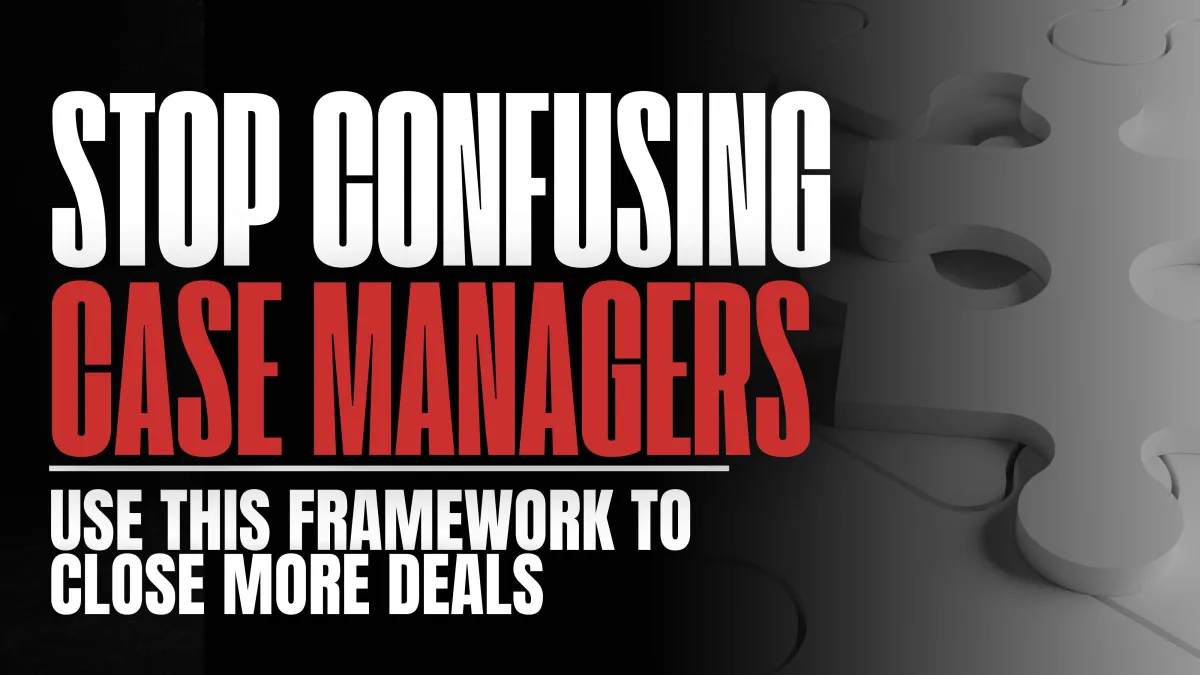
How a Framework Can Transform Your Patient Closures: A Game-Changer for Case Managers
Have you noticed a dip in your KPIs when it comes to patient starts? Are your case managers facing confusion that’s impacting their ability to close? You’re not alone. Many healthcare teams face this challenge, and often, it comes down to one key element: framework.
The reality is that many practices rely on multiple scripts for different areas of treatment—neuropathy, physical medicine, weight loss, and so on. While this may seem like a logical approach, it can often lead to confusion for case managers, and patients can pick up on that. The result? Missed opportunities and lower closures. But the good news is that the solution to this challenge lies in the power of a structured framework that can streamline your processes, increase patient conversions, and boost the overall efficiency of your team.
Let’s dive into how adopting a consistent framework can help improve your case management process and lead to higher patient starts and better closure rates.
🧠 Why Framework Over Script?
Using multiple scripts for different conditions may seem effective at first glance, but it can create unnecessary complexity and confusion for case managers. When case managers rely on different scripts, it leads to inconsistencies in their communication with patients and can cause delays or even missed opportunities.
Instead, a structured framework can be applied to every patient interaction, ensuring consistency, clarity, and a more effective approach to handling patients.
A great example of such a framework is the CASCADA framework, which is designed to guide case managers through a patient’s initial consultation and report of findings. Here's how it works:
C: What is their complaint?
A: How is it affecting them?
S: What is the severity of the issue?
C: Do they acknowledge that they have a problem?
A: Are they demanding a different outcome?
D: How do they engage in the process to get better?
E: What is the expected outcome or goal for their care?
By focusing on this framework, case managers can confidently guide patients through their concerns, ensuring that each conversation builds on the last and leads to a successful resolution. This reduces confusion, boosts confidence, and ensures that everyone on your team is aligned in how they approach patient care.
💡 Tip 1: Creating a Dialogue, Not a Monologue
One of the most common mistakes in case management is engaging in a monologue with patients. When case managers simply talk at the patient without creating a two-way conversation, it doesn’t allow the patient to express their full concerns, and the emotional connection is lost.
The key to breaking this pattern is to ask the right questions. A well-structured question encourages dialogue, helps build rapport, and leads to a better understanding of the patient’s needs. Rather than just following a script, case managers should be trained to listen actively and create an engaging conversation that allows the patient to feel heard and understood.
📝 Tip 2: Handling Objections with Confidence
Objections are inevitable in any healthcare setting, but they don’t have to derail the patient’s journey. With the right framework, your case managers will be better equipped to handle objections with confidence and professionalism.
Cognition to Close is a strategy that integrates into the CASCADA framework, focusing on how to navigate and overcome objections. When case managers understand the most effective ways to respond to patient concerns, they can maintain control of the conversation and keep it focused on achieving a positive outcome. By preparing them with the tools to address objections, you ensure they’re ready for anything that may come their way.
🔑 Tip 3: Real-Life Example of Success
The effectiveness of this framework is evident in its real-world impact. When one practice recently implemented the CASCADA framework, their patient closure rate increased by a staggering 200%. This wasn’t just about having a script for each treatment—it was about having a solid framework that case managers could rely on to guide their interactions with patients.
This dramatic improvement shows that when your case managers have the right tools to create meaningful dialogue, handle objections, and maintain focus, the results speak for themselves. Higher patient conversions, better care, and a more confident team are just the beginning.
🎯 Bringing It All Together
The goal of adopting a structured framework like CASCADA is to ensure that your case managers are not only confident in their approach but are also able to adapt and perform effectively across a range of patient interactions.
When your team is equipped with a clear, actionable framework, they’ll be able to navigate any situation with confidence, leading to better patient care, higher closure rates, and a more efficient workflow.
💡 Final Thought: Is Your Team Ready for Change?
If your case managers are struggling with confusion or uncertainty, it might be time to consider implementing a framework that brings clarity and structure to every interaction.
By focusing on a consistent, results-driven approach like the CASCADA framework, you can empower your team to work more effectively, build stronger patient relationships, and ultimately, improve your patient closures.
Ready to make the change? Start by training your case managers with a framework that works, and watch as your practice thrives.
🎥 Prefer to watch this breakdown? How a Framework Can Transform Your Patient Closures: A Game-Changer for Case Managers
WHO WE ARE
At MedPro Dojo, we specialize in helping healthcare teams like yours improve communication, enhance hiring practices, and achieve better patient outcomes through active learning and tailored strategies. Whether you're a case manager, healthcare provider, or leader in your clinic, we're here to support you in creating better work environments and building stronger teams.
📩 Email: [email protected]
📞 Call or Text: (833) 678-0800